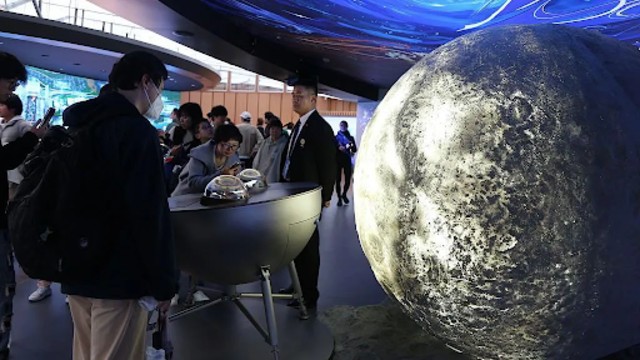
Chinese researchers are unable to access NASA's moon samples due to US restrictions. Getty Images
China has agreed to let scientists from six countries, including the United States, study Moon rocks it collected during its Chang'e-5 mission in 2020. This comes despite the ongoing trade war between the two nations. The China National Space Administration (CNSA) announced this decision, marking a rare scientific collaboration amid political tension.
The US institutions receiving the samples are two NASA-funded organizations. According to Shan Zhongde, the head of the CNSA, these lunar samples are "a shared treasure for all humanity." This gesture is seen as a step toward international cooperation in space exploration, although the United States and China are still locked in a bitter trade dispute.
While Chinese researchers have been unable to access NASA's Moon samples due to restrictions imposed by US lawmakers, this exchange breaks new ground. Since 2011, a US law has banned NASA from collaborating with China unless Congress specifically approves it. However, experts like John Logsdon, a former director of the Space Policy Institute at George Washington University, emphasize that this exchange is unrelated to politics. "It's international cooperation in science which is the norm," he said. He also pointed out that the lunar sample exchange holds "nothing of military significance."
Despite the ongoing trade war, with tariffs of up to 245% on Chinese goods and 125% tariffs from China on US goods, this scientific exchange shows that cooperation in space exploration remains possible. US President Donald Trump had once hinted at a possible de-escalation of the trade war, but China denied any ongoing negotiations.
In 2023, the CNSA invited scientists to apply for a chance to study the Chang'e-5 Moon samples. These samples are unique because they are believed to be about a billion years younger than those collected by the Apollo missions. Dr. Logsdon explained, "So it suggests that volcanic activity went on in the moon more recently than people had thought."
While the idea of sharing Moon rocks was discussed by space officials from both China and the US last year, it seems no agreement came from those talks. Besides the two US institutions, other winners of the chance to study the samples include universities in France, Germany, Japan, Pakistan, and the UK.
Shan from the CNSA stated that the agency is committed to "maintain an increasingly active and open stance" in international space cooperation. He believes that China's involvement in space will continue to expand, especially under the Belt and Road Initiative's space information corridor.
In conclusion, despite political tensions, China and the US have found common ground in space science. The exchange of Moon samples marks a hopeful step for future collaborations in space exploration, where science can transcend national disputes.















